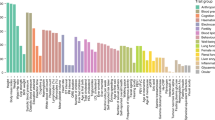Abstract
Consanguineous marriages have been favoured throughout South India for many generations. On theoretical grounds it was proposed that long-term inbreeding would have resulted in the elimination of deleterious, recessive lethal and sub-lethal genes. As part of a newborn screening programme for amino acidopathies, data were collected on the level of inbreeding in the current populations of the cities of Bangalore and Mysore, and on the relationship between consanguinity and mean numbers of liveborn and living children. Mean cnonsanguinity was 32.24%, equivalent to a cuoefficient of inbreeding in the newborns,F = 00271. There were no significant differences between the various inbreeding classes in the number of liveborn or living children, nor was a significant consanguinity-related effect on the proportion of survivors detectable. In the light of these findings, the effects on the gene pool of multiple generations of inbreeding are discussed.
Similar content being viewed by others
References
Asha Bai P V, Jacob John T and Subramaniam V R 1981Trap. Geogr. Med. 33: 275–280
Bittles A H, Radha Rama Devi A, Venkat Rao S and Appaji Rao N 1982Biochem. Rev. L II: 20–24
Centerwall W R, Savarinathan G, Mohan L R, Booshanan V and Zachariah M 1969Soc. Biol. 16: 81–91
Chakraborty R and Chakravarti A 1977Hum. Genet. 36: 47–54
Dronamraju K R 1964Cold Spring Harbor Symp. Quant. Biol. 29: 81–84
Dronamraju K R and Meera Khan P 1963aAda Genet. (Basel) 13: 21–29
Dronamraju K R and Meera Khan P 1963bJ. Genet. 58: 387–401
Ericksen J A, Eriksen E P, Hostetler J A and Huntington G E 1979Pop. Stud. 33: 255–276
Haldane J B S 1963 inGenetics today (ed.) S J Oeerts (The Hague: Pergamon) pp. 91–102
Hann K L 1985Ann. Hum. Biol. 12: 267–274
Kumar S, Pai R A and Swaminathan M S 1967Ann. Hum. Genet. 31: 141–145
Malhotra K C 1979J. Biosocial Sci. 11: 397–409
Papa Rao A and Rami Reddy V 1983Soc. Biol. 30: 109–111
Radha Rama Devi A, Appaji Rao N and Bittles A H 1981Ann. Hum. Biol. 8: 469–472
Radha Rama Devi A, Appaji Rao N and Bittles A H 1982Hum. Hered. 32: 8–10
Rao P S S.1983Soc. Biol. 30: 413–422
Rao P S S and Inbaraj S G 1977aSoc. Biol. 24: 281–288
Rao P S S and Inbaraj S G 1977bAnn. Hum. Genet. 41: 87–98
Rao P S S and Inbaraj S G 1979aAnn. Hum. Genet. 42: 401–413
Rao P S S and Inbaraj S G 1979bJ. Med. Genet. 16: 24–31
Rao P S S, Inbaraj S G and Kaliaperumal V G 1971Indian J. Med. Res. 59: 294–301
Ray A K 1979J. Hered. 70: 281–282
Record R G and Armstrong E 1975Brit. J. Prevent. Soc. Med. 29: 267–273
Reid R M 1973 inGenetic structure of populations (ed.) N E Morton (Honolulu: Univ. of Hawaii Press) pp. 92–99
Sanghvi L D 1966aIndian J. Genet. A26: 351–365
Sanghvi L D 1966bEugen. Quart. 13: 291–301
Schull W J, Furusho T, Yamamoto M, Nagano H and Komatsu I 1970Humangenetik 9: 294–315
Schull W J, Yanase T and Nemoto H 1962Hum. Biol. 34: 271–298
Schull W J and Neel J V 1965The effects of inbreeding on Japanese children (New York: Harper and Row)
Schull W J and Neel J V 1972Am. J. Hum. Genet. 24: 425–453
Venugophal Rao V and Murty S 1984Soc. Biol. 31: 114–119
Vital Statistics Division 1982 Levels, trends and differentials in fertility, Office of the Registrar General (India), Ministry of Home Affairs, New Delhi
Author information
Authors and Affiliations
Rights and permissions
About this article
Cite this article
Buttles, A.H., Devi, A.R.R., Savithri, H.S. et al. Inbreeding and post-natal mortality in South India: Effects on the gene pool. J. Genet. 64, 135–142 (1985). https://doi.org/10.1007/BF02931142
Received:
Issue Date:
DOI: https://doi.org/10.1007/BF02931142




